Staying in Phase One
The Valencian government has decided not to push for the region to pass to Phase Two on Monday 25 May.
In a U-turn to what she had previously said, the Valencian health minister Ana Barceló announced on Tuesday that she would not be making the request to the central government in Madrid. She said that the region would be ‘prudent’ and wait until 1 June in order to aim to pass in its entirety, rather than in parts. She explained that while the numbers regarding infections were good, the reproduction rate of the virus had increased very slightly from 0.66% to 0.88%.
The move was questioned by the People’s Party (PP) mayors of Alicante, Torrevieja and Benidorm, who had wanted to know why a move that would help the retail and hospitality industries wasn’t being requested. Benidorm mayor, Toni Pérez, complained of a ‘lack of transparency’ and asked for further information from the health department regarding the decision.
As part of the effort to contain the virus during the de-escalation process, Ana Barceló also announced this week that the Valencian government would be contracting 1,210 more staff to help in the fight against Covid-19. The jobs would be for contact tracing in primary care and include 600 nursing professionals, 334 administrative assistants, 185 orderlies and 91 auxiliary nurses.
As of Thursday face masks are now mandatory for anyone aged over six in a public space, where 2 metres of social distancing cannot be maintained. The rule was brought in nationwide on Thursday and face masks are also recommended for those aged between 3 and 5. However, there are some exceptions for people with certain illnesses, such as asthma.
The Internet abounds with instructions on how to make a face covering, either sewn or not, but if you’re handy with a sewing machine, follow this link for some instructions that are some of the best I’ve found. They are clearly explained and have three layers which include a middle ‘filter’ layer.
Tourism
National tourism could be the saviour of the Valencian tourist industry this season, given that foreign visitors may not be able to arrive until during July.
Movement between provinces could begin at the end of June, although what’s not certain is when visitors from Madrid and Barcelona will be able to arrive, as they have been far worse hit by Covid-19, and de-escalation may be slower.
Meanwhile, despite being able to re-open, most Costa Blanca hotels remain closed due to the strict opening conditions. Not only are all communal areas, like pools and dining-rooms, currently closed off during Phase One of de-escalation, there are also limits on occupancy – and for those who rely on visitors from abroad their guests are currently unable to travel to their destinations.
To help the industry, the Costa Blanca tourist board this week launched a new section on its website listing those accommodation providers which were re-opening. The initiative is part of its #Sigueencasa campaign.
¿Quieres saber qué hoteles 🏨, casas rurales 🏡, campings🏕 y empresas turísticas hay abiertas en la Costa Blanca? Consulta nuestro listado 👇 https://t.co/GShZ2WtCCD#SigueEnCasa #CostaBlanca pic.twitter.com/wN2Pj2K2yk
— Turismo Costa Blanca (@costablancaorg) May 21, 2020
Bar and restaurant terraces across the region have started to re-open but they can only have 50% capacity. In coastal holiday areas some are choosing to wait until Phase Two, when restrictions will be eased slightly. Others may only have a very small terrace or none at all, so they are unable to open.
Another problem facing the tourism industry is the rule, announced by prime minister Pedro Sánchez at the beginning of last week, that travellers arriving from abroad will have to spend 14 days in quarantine on arrival in Spain. Those arriving are also required to give their address details to Spanish healthcare officials so they can check they are observing quarantine. The measures remain in place during the ‘state of alarm’ – recently extended until 7 June.
And as if to rub salt into the wounds of the travel industry, neither Alicante-Elch nor Valencia-Manises airports were included in the original list of airports to re-open when it was announced last week. This was later rectified, following complaints from business associations, and Valencia-Manises received its first flight of 30 passengers from Zurich, Switzerland, on Thursday.
#volveremosavernospronto para disfrutar de paraísos cercanos como la Isla 🏝 de #Tabarca.
Este maravilloso #rincónmediterrráneo 👌😍 te espera cuando esto pase✌️😷. https://t.co/H7ewOBwJrs#viajar #Alicante #próximodestino pic.twitter.com/HtaQeopnPZ— Turismo Alicante (@Alicante_City) May 6, 2020
Schools in the Valencia region
On Tuesday (19 May) the Valencian department of Education set out the dates of enrolment for the coming academic year (2020/21) and with the Valencia region now all in Phase One, schools have begun the first steps of re-opening for cleaning and disinfecting.
Enrolment for Infant and Primary will open online between 8-16 June, while ESO, Bachillerato and other educational stages will be between 17-25 June. A special app has been prepared to help families apply online. More information will be given shortly, but in order to apply online via the app, families will need a password which they can obtain with their DNI or NIE. The app will be operative from 8 June.
For those who don’t have access to the Internet the application process can be done in person at the school of first choice.
This week teachers and admin staff have been going into centres to start the process of cleaning and preparation. Families are now also able to make appointments to collect materials needed for the remainder of the current school year which will continue to be carried out online. To this end, schools have also been encouraged to help families with limited access to technological devices wherever possible, by lending out school laptops or tablets.
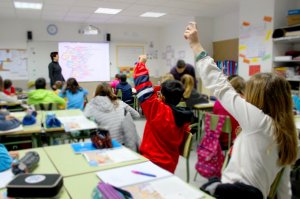
Moving towards Phase Two
The Valencian education department has set out guidelines for the conclusion of the 2019-20 schoolyear. The third term dates will stay the same, meaning the school year will conclude on 16 June for ESO and Bachillerato and 18 June for Infants and Primary. However, in Valencia city and surrounding towns, there may have been an extra day or two added in order to complete the holiday week of Las Fallas. Access exams for university (EBAU) and Formación Profesional courses will take place in the first weeks of July.
As we move into Phase Two, schools will be able to organise specific in-person group activities for resolving problems and queries. These are especially aimed at those students who haven’t had the same opportunities as their classmates to attend online. These activities are optional and voluntary. School management teams will decide which activities should take place and which students should attend.
Infant education will definitively not be reopening until September, even though there had been speculation about it. Prime Minister Sánchez had proposed schools partially reopening on 1 June for 0-6 year-olds where both parents needed to work, but this idea was widely rejected by the regional governments across Spain and as education is a devolved power, the idea was squashed.
Meanwhile, private nurseries for 0-3 year-olds, which currently receive financial help from the government while closed because of the Covid-19 pandemic, will actually lose that aid if they re-open and will have to manage with just the income they receive from families.
Students of Educación Especial will also not return until September.
The end of the 2019-2020 academic year
Teachers and schools have been advised to adapt their curriculums to the circumstances, with a focus on reinforcing and consolidating what has been taught in the previous two terms and only choosing the most relevant content for this term. The aim should also be to help students and families maintain routines and study habits at this time. Educators have also been reminded to pay attention to the emotional aspects by, for instance, offering individual online tutorials for those who need them.
Regarding exams, grades and certificates, the aim is to help students pass the year. The final mark for each subject will be based on a student’s marks in the previous two terms. However, they will have the opportunity to increase that grade based on their interest, effort and attitude in the third term. What has been made absolutely clear to teachers though, is that students cannot have their final mark affected (ie, reduced) because of the third term.
In Spain if students are perceived not to have grasped the necessary concepts to pass to the following year and have a certain number of failed subjects, they are made to repeat. It is a very contentious issue and argued by some that this can have extremely negative social and emotional effects on the child. (But that is something for a separate article altogether). However, this year, in general students won’t repeat and will pass to the next level. The government has advised that only under very extreme circumstances, and with solid justification can a student be made to repetir.
2020-21 school year
The government has confirmed that the next school year will begin on 7 September and finish on 23 June 2021 for all students (Infants, ESO, Bachillerato and FP) and teachers have been advised to change their programmes for the start of the year to include a revision of the content studied during lockdown to ensure nobody is left behind. Schools will also be encouraged, though not obliged, to keep the same tutors as this year.
Looking ahead to September there is only one thing which is certain: the return to school will be unlike any we’ve seen before.
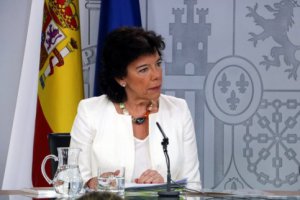
The details are still being worked out, but the Education Minister in Madrid, Isabel Celaá has said that until a vaccine is found, there cannot be 30 students in a class, so only half the students will be able to attend at any one time. Given that many classrooms have the students tightly packed like sardines, something will have to change, be it alternating groups of 15, with a combination of presential and online classes, splitting groups or even installing partition screens in classrooms.
At the moment nobody knows what the classrooms of September will look like because, after all, it depends on so many different factors.
One school, however, where online classes or Perspex screens won’t be necessary is Ribaroja’s Colegio María de Iciar, where students already enjoy classes of reduced numbers in an idyllic countryside setting of 70,000m2. Head teacher Estibaliz Vilar Rey said: ‘Our students will be able to continue their education every day without having to do classes online. We’re close to Valencia but in an area which is not densely populated, and we have plenty of space here in the open air. We are used to working with groups of between 10 and 15 students.’
FIB music festival cancelled
The Benicàssim International Festival (FIB) has become the latest casualty to Coronavirus after organisers cancelled the event earlier this week.
The festival which was due to take place between 16-19 July and had a huge line-up of talented artists, including Liam Gallagher, Khalid, Vampire Weekend, Rita Ora and the Kaiser Chiefs.
The festival, which is in its 26th year, combines indie, rock and alternative music with hip hop, pop and dance -bringing artists and audiences from across the globe who come, not only come to enjoy the music, but for the ideal location next to the sea on the Costa del Azahar.
Started in 1995, FIB has become a firm fixture on the festival circuit but promises it will be back next year. The organisers thanked their followers for the supportive messages they’d received and, looking to the future, said: ‘Soon we’ll see each other again, we’ll feel the sand of Costa de Azahar on our feet, the Mediterranean breeze on our faces and the hugs of our friends.’
Anyone who bought tickets for this year’s festival can find information on getting a refund by clicking here.
Stranded at the drive in?
Meanwhile residents in Alicante who’ve been missing the cinema will soon be able to watch films at the new Cinemacar drive-in, set to open its doors on 11 June.
The new leisure facility, in Rabasa, will offer food and drink and premium seats but all within the new hygiene standards against Covid-19. Click here for further information.
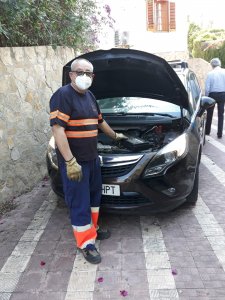
Not Greased Lightening
This week we had to call the grua to come and (you’ve guessed it) … start my car. After two long months on the drive the battery was flatter than East Anglia.
And it seems that I’m not alone. The mechanic who came and got me up and running told us they’ve been working overtime during lockdown – and that this week they’ve been attending around 10 flat batteries a day.
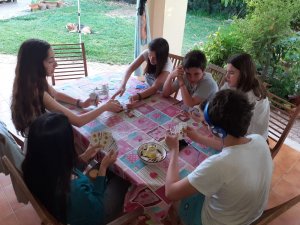
Invasion of cousins in l’Eliana
As I guessed, being the first weekend when families can meet in groups of up to 10, we were invaded by cousins. I now have to tidy up the house a bit. Or perhaps not. With them all still in the house … what’s the point?

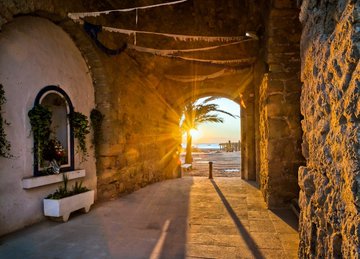

4 comments
Hi Catherine
Well done with your first article, very informative and easy to read.
I do have one question that you might be able to help me with. On the main Spain in English site it states that only one person can sit in the second row of a car if the people are from a different residence, but I have several friends telling me that I am wrong, and that you can have two people in the second row, so long as they are waring ace masks. Could you confirm who is correct.
Many thanks
Gary Hutton
PS: good idea to leave the rubbish, more family around today or tomorrow no doubt. Good Luck!
Hi Gary – thank you for your comment. We are replying instead of Catherine. Our understanding of the rule is currently as follows: “Vehicles (with the capacity) are permitted to be occupied by up to nine people. However, If the occupants of a vehicle do not live together, a limit of one person in each row of seats applies, and they will have to wear face masks.” Restrictions are being relaxed further over the coming days, so this might change. Hope this helps for now.
I llive in a very small community.At this time from the start of lock down our pool has been taped off.
There are only 5 residents here out of 26.In this only 3 are of an age capable of swimming
The pool area is of a size easily capable of social distancing.
But even better is that we can agree times for each resident too have a timetable.So only one person at a time in the pool.
What really is irritating is that the beach here is being used and abused.
Frustrated of Rojales .Quesada
Hi David,
Glad to hear that you’re able to agree about when to use the pool. Hopefully now that there are strict rules about the use of beaches yours will be less abused.
Do let us know if that’s not the case.